FREE Standard Shipping On All Orders $100 or More!*
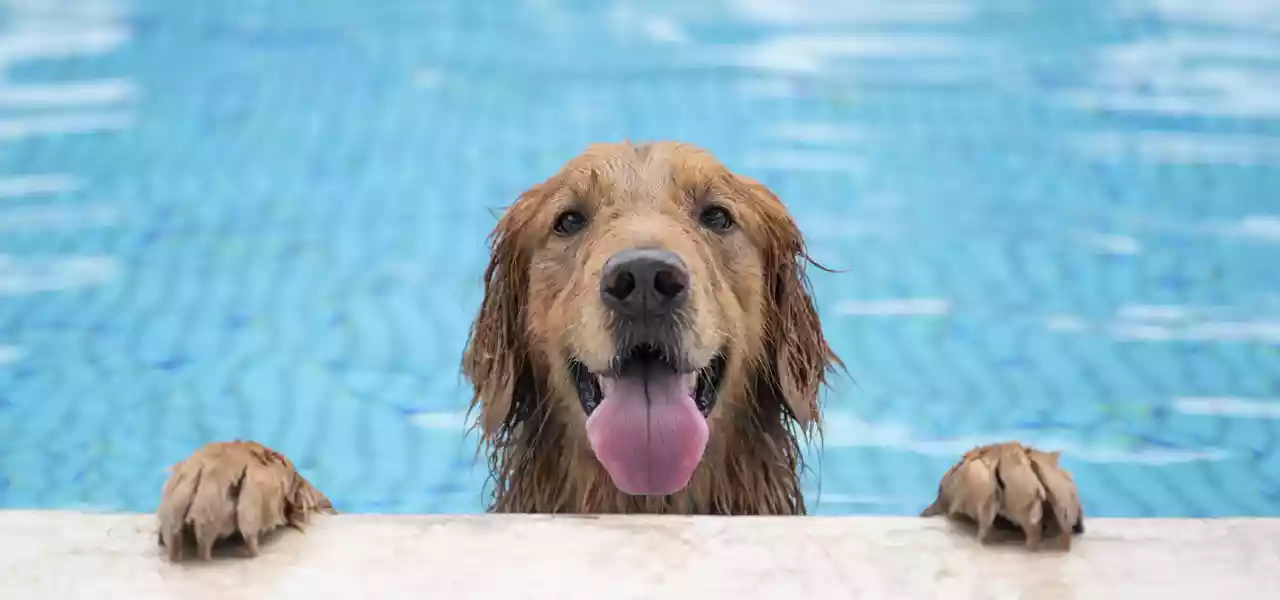
Dogs in the Swimming Pool
As man's best friend, dogs provide tireless loyalty, unconditional love, and endless entertainment. Their warm, fluffy bodies keep you warm at night, and their quirky antics always keep a smile on your face. So it's no surprise that many dog owners want to spend as much time with their trusty sidekick as possible, even in the swimming pool! But there is much debate around allowing dogs in the swimming pool, and whether or not it's a good idea. In this article, we will discuss the benefits and potential problems of letting your pooch in the pool.
Should Dogs Be Allowed in the Swimming Pool?
The short answer to this common question is — it depends. While many dogs love pools and experience no ill-effects from swimming, it's important to remember that not all dogs are pool-friendly, and not all pools are dog-friendly. Some dogs are natural born swimmers, and give their owners a run for their money trying to keep them out of the pool. While other dogs prefer to stay out of the splash zone and watch from a distance. Just like people, some dogs are scared of the water or simply don't enjoy swimming.
Also consider your pool's durability and compatibility with your canine companion. Some pools, like concrete or gunite pools, are more durable than fiberglass or vinyl-lined pools, and can handle the wear and tear your dog may cause. If your above ground or inground pool has a vinyl liner, you’ll want to use extra precautions. Dogs’ sharp nails may scratch or puncture vinyl liners, which can eventually create leaks and other problems. If possible, train your dog to swim away from the walls and learn where to enter/exit the water.
Pool and Pooch Compatibility
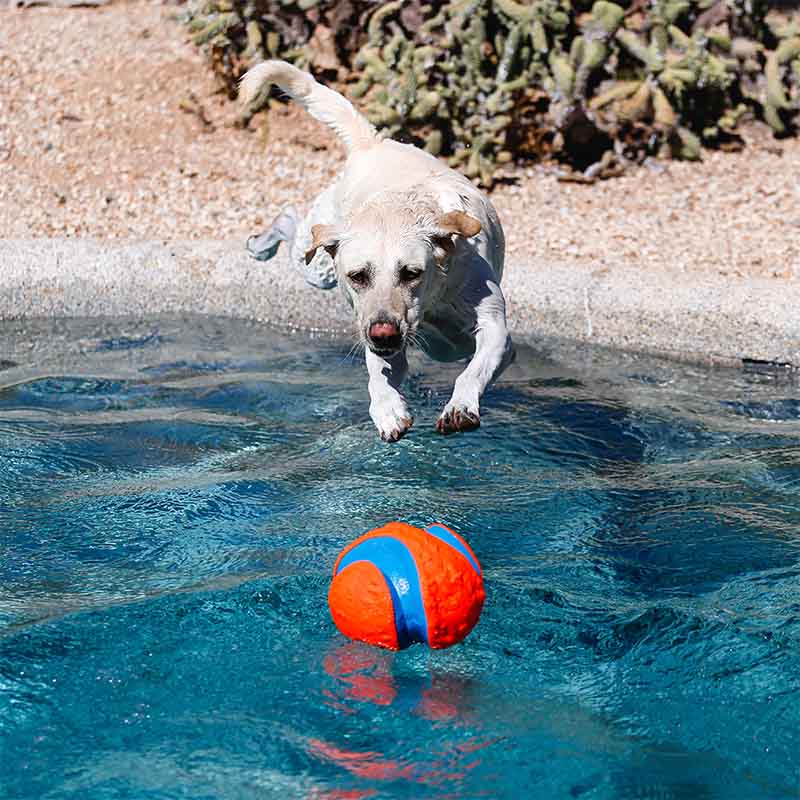
Dogs are incredible animals who bring us so much joy, love, and entertainment. But they're also animals who enjoy digging in the mud and rolling in the grass, and can carry 3x more pollutants than humans. This includes anything from insects, to dirt, to fecal matter. We know, yuck! That being said, it's likely no surprise your dog's presence can have a negative effect on your pool's water chemistry.
If your dog is a frequent swimmer, it’s important to check the pool water chemistry more often to ensure chemicals are balanced. Adding a water clarifier to your pool will help break down oils and other contaminants that enter your pool after your dog swims. Doing so will also take some strain off your filter. The addition of contaminants may also lower your chlorine level, so keep some pool shock on hand.
Depending on your dog’s hair length/type, your filter and skimmer baskets may fill up quicker than normal. Use a handy skimmer shield to protect your skimmer, and filter, from an onslaught of dirty dog hair, and be sure to clean or backwash the filter often. Though it may not happen with every dog, cleaning your pool filter more frequently is still a good practice to keep in mind.
If you think vacuuming dog hair out of your bedroom carpet is a hassle, you may want to think twice about letting your pooch in the pool!
Safety First
Whether you have a water-loving Labrador, or a couch potato Pug, keeping your pooch safe in the pool should always be your number one priority. Many of the same water safety rules that apply to people also pertain to dogs, like ensuring your four-legged swimmers are supervised at all times. Even the most aquatically-skilled dogs can become distressed and require assistance while swimming. Below are a few safety precautions to keep in mind whenever your dog is in the pool.
Pool Entry and Exit
Many inground pools have shallow steps or even beach-entry access, which are ideal for your canine companion. Take some time to show your dog how to get out of your pool, before letting them rip. Once they understand where your pool's entry and exit points are, they typically have no trouble safely getting in and out. Above ground pools tend to be less dog-friendly, as their main point of entry and exit is usually a ladder. Installing a pet ramp or deck is a great way to make it easier for your dog to get in and out of an above ground pool.
Swimming Skill Level
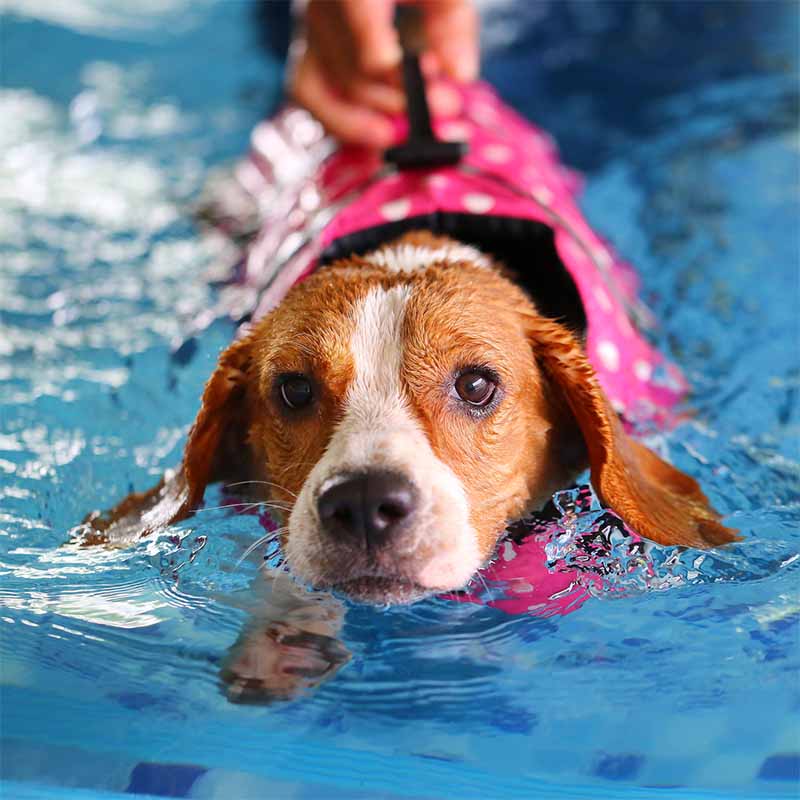
Many dog breeds, like Standard Poodles, Retrievers, and Newfoundlands, are naturally strong swimmers. They take to the water like fish, and typically have excellent stamina. While they still require supervision and time to rest, they are less likely to get fatigued and struggle. Smaller dogs and brachycephalic breeds, like Bulldogs and Pugs, are high-risk swimmers, and often require the help of a dog life vest or flotation device to safely enjoy the pool.
While this might take a bit of convincing, especially for the more water-obsessed breeds, encourage your dog to rest periodically while swimming. Pools offer a great source of entertainment for dogs and are a wonderful way to burn off extra energy. But just like with young kids, they can over-exert themselves and quickly become exhausted.
Pool Water Intake
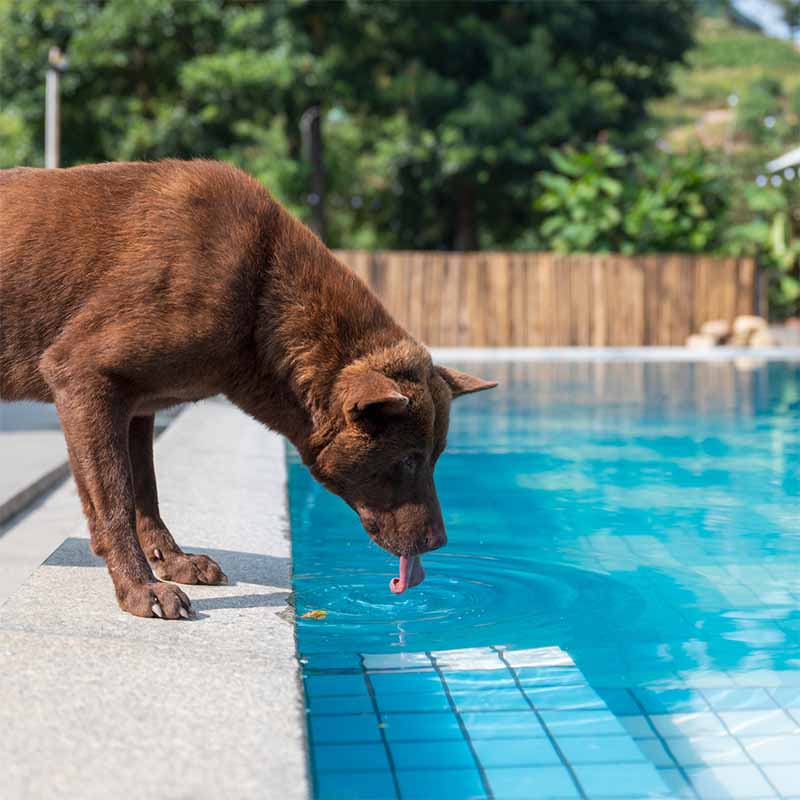
It's normal for dogs to lap up some pool water as they swim. And the longer they're in your pool, the more water they are likely to ingest. While consuming a small amount of pool water is relatively harmless to your dog, an excessive amount of chemically-treated water can wreak havoc on their body. Vomiting, diarrhea, and even esophageal damage are all indications that your pup has ingested too much pool water. In rare cases, dogs can develop water intoxication, a dangerous condition that creates an extreme electrolyte imbalance. If severe enough, this can lead to brain damage and even death.
A tired, thirsty dog won't know the difference between pool water and drinking water, so always provide your dog with a bowl of fresh, clean water on swim days!
Water Chemical Use and Storage
Before allowing your dog, or people, to swim in your pool, test and balance the water chemistry. Imbalanced water chemistry, specifically elevated chlorine levels, can irritate your dog's skin, eyes, and respiratory system. Follow all chemical dosing instructions carefully, and ensure toxic chemicals like shock and algaecides are fully diluted into the water before letting your dog swim.
Additionally, store all pool chemicals in a safe area, out of your dog's reach. Most dogs have a big appetite and child-like sense of curiosity, so avoid any opportunity for your dog to ingest dangerous pool chemicals. This includes cleaning up any spilled chemicals on the deck or pool equipment.
Swimming Benefits for Dogs
Just like for people, swimming offers a fantastic, low-impact workout for your dog. It's a great way for them to build muscle, recover from an injury, or just burn off some extra steam. Taking a few laps around your pool engages almost every muscle in your dog's body and is a fantastic cardiovascular workout. Whether your dog needs to shed a few pounds, rehab an injury, or just wants to spend some time splashing around with their humans, there's no better place than the pool. And nothing beats the dog days of summer like a refreshing doggy paddle!
How to Care for Your Pup and Pool Post Swim
Once all the fun and games are over, there are a few post-swim dog and pool care tips to follow.
Dog
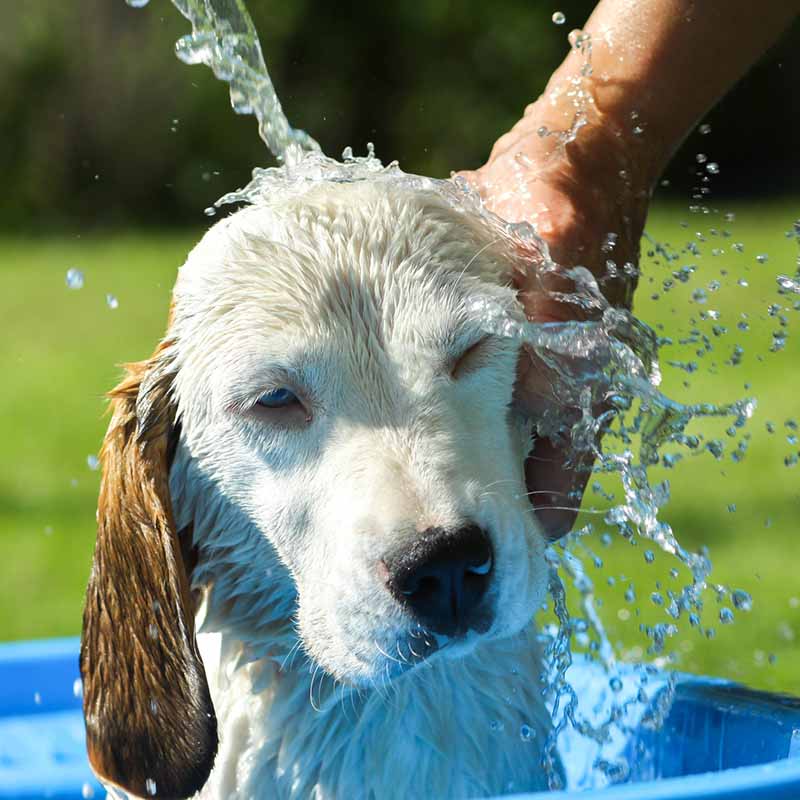
- Rinse them off to clear any water chemical residue off their coat and skin. If your dog has a thick, dense coat, they may need a full shampoo bath to ensure everything gets washed away.
- Dry them thoroughly with a towel, and pay special attention to their ears. Their ears don't drain well and are prone to infections.
- Once they're dry, and allowed back in the house, ensure they drink plenty of water. Remember, swimming is tiresome work, so your dog will likely be quite thirsty.
Pool
- First, use a skimmer net to scoop up any debris or hair from your pool water. Then empty your pool skimmer and remove the skimmer guard if applicable.
- Test the water and add any balancing chemicals if necessary. If you don't plan to use your pool again in the next 12 hours, hit it with a strong dose of shock. Shocking your pool will clear out any brewing contaminants or bacteria brought in by your pup. Use a water clarifier if your pool is looking a bit cloudy.
- If your dog likes to swim regularly, inspect your pump and filter often. Dirt and hair can clog your pump and fill up your filter. Clean out your pump's basket and backwash or clean your filter if your pressure gauge reads higher than the normal level.
Dogs truly are man's best friend and deserve to share as many fun experiences as possible! Swimming is a great way to spend time with your dog and help them get some extra exercise. Just be sure to follow proper pool safety practices, and clean up your pup and pool when you're done.